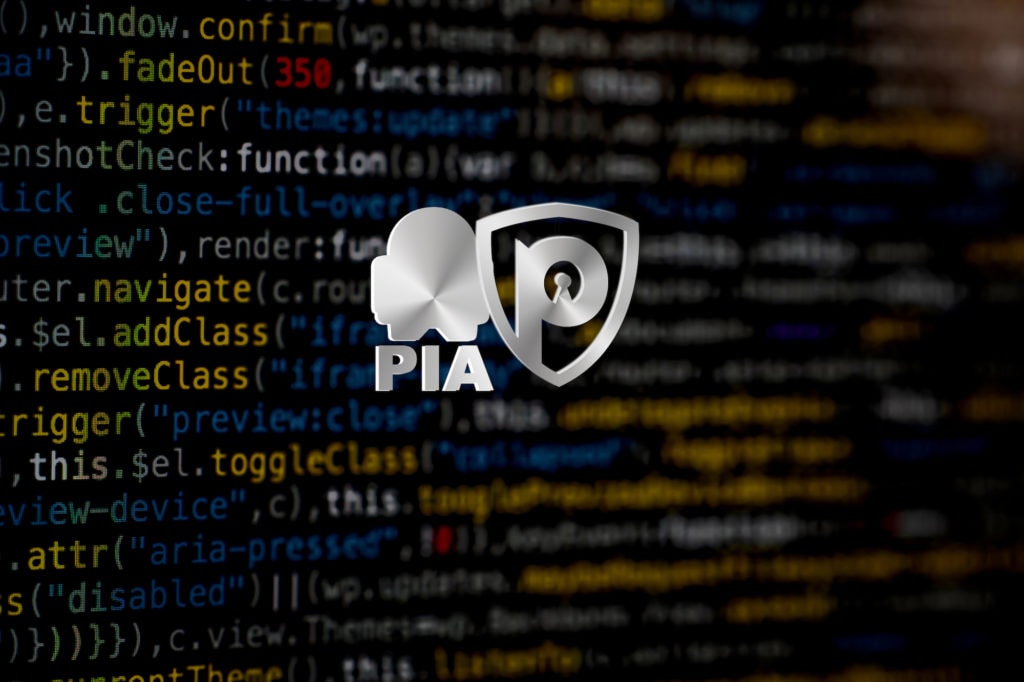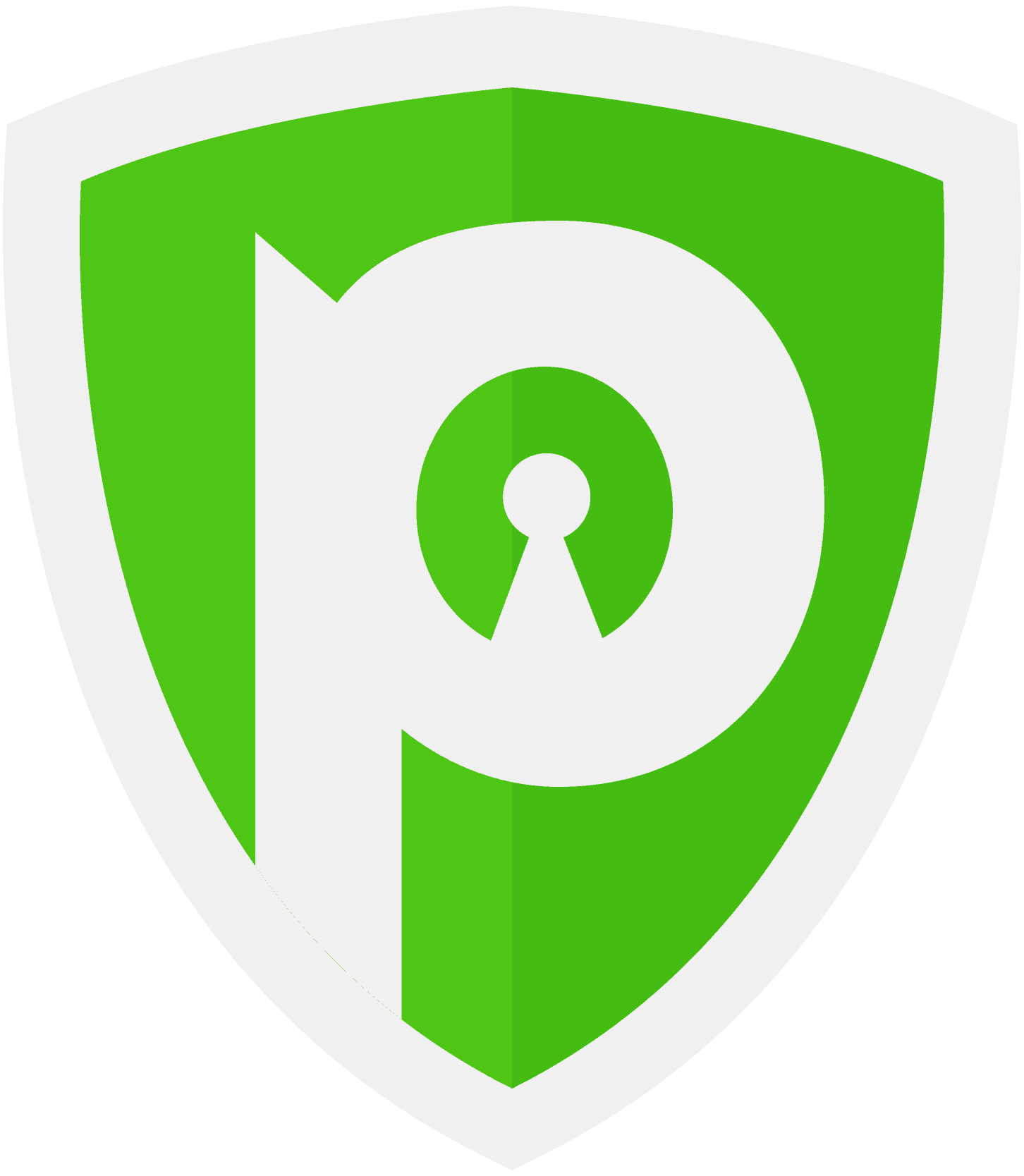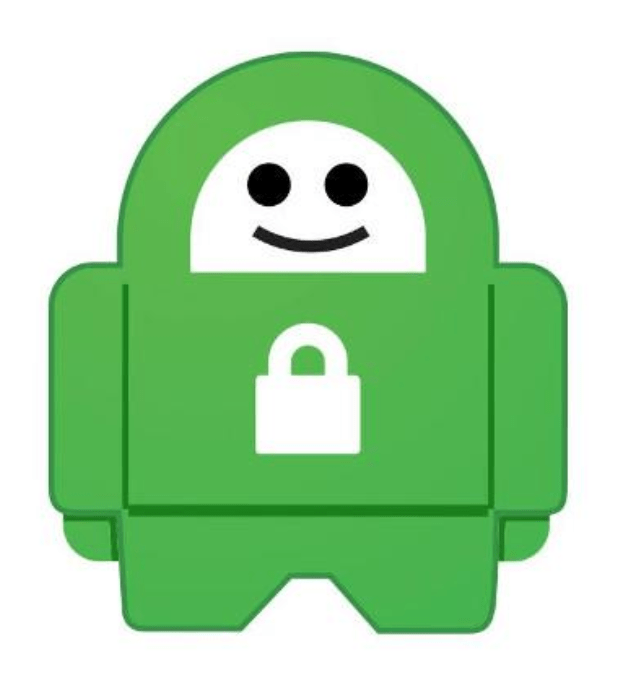In order to get the security and privacy benefits a VPN can provide, you need to make sure you choose the right one. And that may not be as easy as one might think.
With VPNs having gone mainstream and all the features being touted, it can be difficult to assess a VPN provider’s strengths and weaknesses, as we as determine how a VPN provider sets itself apart from its competition.
So, with that in mind, in this post, we are comparing Private Internet Access and PureVPN.
We’ll be comparing them on various aspects of their respective feature sets in order to set them apart and make a recommendation.
Let’s get started with our PureVPN vs. Private Internet Access comparison.
PureVPN vs Private Internet Access - Side By Side
| Name | Private Internet Access | PureVPN |
|---|---|---|
| Rating | 8.5/10 | 6.5/10 |
| User Friendliness Score | 9 | 7 |
| General features | ||
| Price per month (cheapest) | $2.69 | $3.33 |
| Simultaneous Connections | 10 | 10 |
| Servers | 3292 | 2000 |
| Countries | 46 | 140 |
| Allows torrenting / P2P | Yes | Yes |
| Streaming | ||
| Netflix | No | Yes |
| Hulu | No | Yes |
| Amazon Prime | Yes | Yes |
| Disney+ | No | Yes |
| Security | ||
| Supports TOR | No | No |
| Split Tunneling | Yes | Yes |
| Router Support | Yes | Yes |
| Unlimited bandwidth | Yes | Yes |
| Refund Period | 30 Days | 31 Days |
| Free trial | No | No |
| Desktop Operating Software | Windows, MacOS, Linux | Windows, MacOS, Linux |
| Mobile Apps | iOS, Android | iOS, Android |
| Browser Extensions | Yes | Yes |
| VPN Protocols | IKEv2, OpenVPN, WireGuard, L2TP/IPSec, PPTP | IKEv2, OpenVPN, WireGuard, L2TP/IPSec, PPTP |
| Encryption | AES-256 | AES-256 |
| DNS Leak Protection | Yes | Yes |
| VPN Kill-switch | Yes | Yes |
| Rent/Own Infrastructure | Rent | Own |
| Hacked | No | No |
| Malware/Ad Blocker | Yes | No |
| Privacy | ||
| Logging Policy | No-logging Policy | No-logging Policy |
| Privacy Policy | Good, but could be easier to understand. | Good, but we don't fully trust they conform to their policies. |
| Jurisdiction | U.S.A. | Hong Kong |
| Out of 14 eyes | No | Yes |
| Warrant Canary | No | No |
| Accepts Cryptocurrency | Yes | No |
| Sign-up Information Required | Only Valid Email | Valid Email and name |
| Speed (average) | ||
| Avg. Ping NY | 28.33 ms | 162.33 ms |
| Avg. Download NY | Over a 100 Mbps Network (Download): 94.35 Mbps | Over a 100 Mbps Network (Download): 75.22 Mbps |
| Avg. Upload NY | Over a 30 Mbps Network (Upload): 25.05 Mbps | Over a 30 Mbps Network (Upload): 28.25 Mbps |
Can't choose between PureVPN or Private Internet Access?
PureVPN and Private Internet Access are both well-known players in the commercial VPN market - although PIA may be a bit more of a household name.
Nonetheless, both providers tick some important privacy boxes in regards to their service: Both providers commit to a no-logging policy. And both have also been independently audited.
Two things we like seeing.
However, it was reported by The Register and PCMag, that in 2017, PureVPN spied on its users and handed the information over to law enforcement - a direct contradiction of their privacy policy.
Private Internet Access has a better reputation in that regard, having proven their no-logging claims in a real-world case - which is impressive. PIA, was, however, recently purchased by Kape Technologies, a company with past ties to the ad industry.
That can make some uncomfortable, but we still have no reason to doubt Private Internet Access’ commitment to user privacy - to the point that we can confidently recommend them over PureVPN.
Let’s look at why more closely.
1. Speed
When you’re on the Internet, speed is important, whether you’re using a VPN or not. But a VPN - any VPN - will create overhead, which will cause some slowdown on your connection.
Let’s take a look at how well PureVPN vs PIA compare on speed.
Private Internet Access
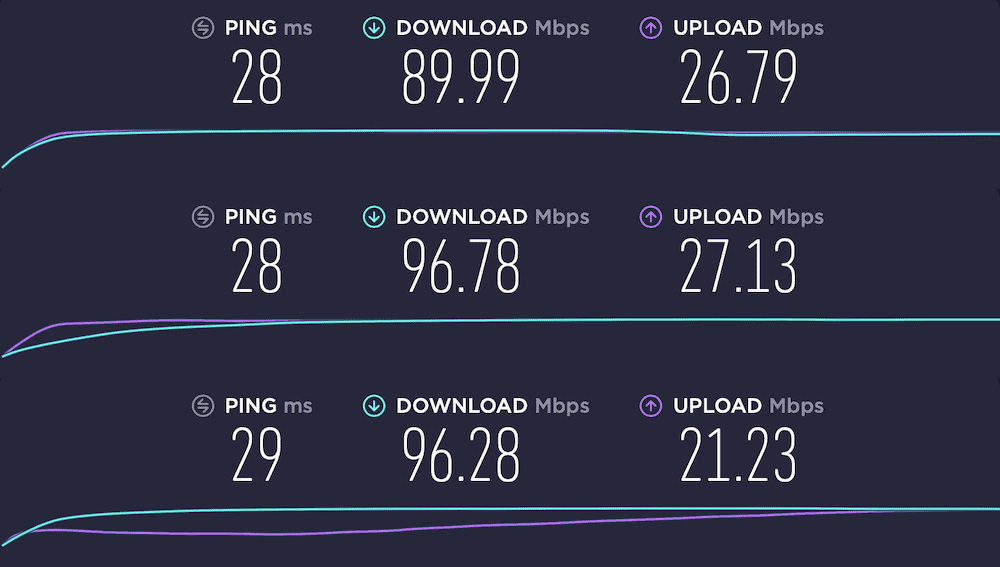
Tested on a 100Mbps (Download) and 30Mbps (Upload) network
Server: U.S.A., New York
Average Download Speed: 94.35Mbps
Average Upload Speed: 25.05Mbps
PureVPN
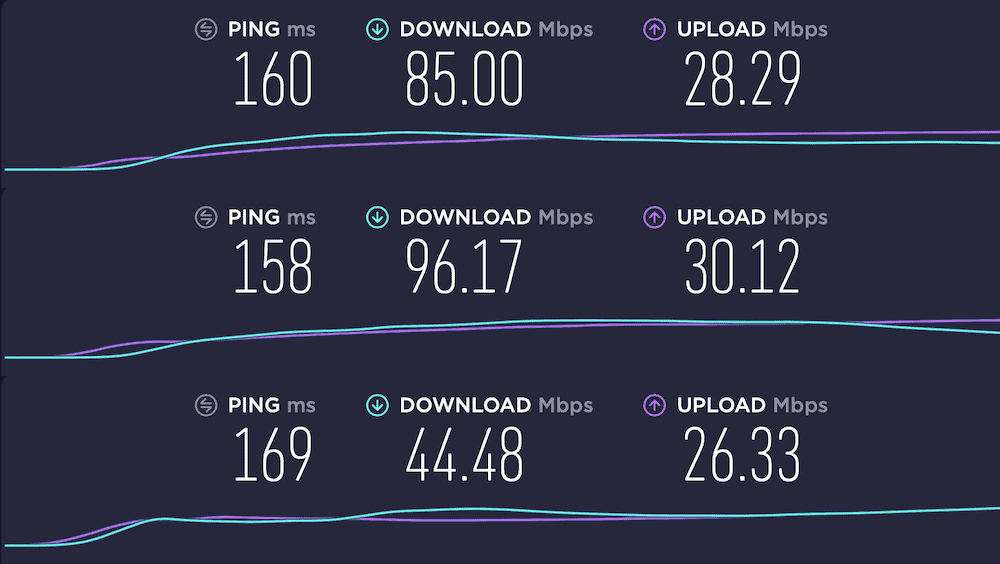
Tested on a 100Mbps (Download) and 30Mbps (Upload) network
Server: U.S.A., New York
Average Download Speed: 75.22Mbps
Average Upload Speed: 28.25Mbps
So, as always, we want to look at the difference between the bandwidth I’m allocated by my ISP (100Mbps on download) and the results of the speed tests.
And we can see a marked difference between Private Internet Access’ speed and PureVPN’s speed.
Over PureVPN, I’m losing about one-quarter of my speed on download. While over PIA, the speed dip would not even be noticeable in a real-world scenario.
On upload, PureVPN does ever so slightly better than PIA. But with such a small difference, this is very likely due to network volatility and we can’t make the claim that PureVPN is faster on upload.
Their performance is pretty much the same on upload - which is to be expected, as ISPs typically provide many more download channels than upload channels.
Winner: Private Internet Access
We’re giving the point to Private Internet Access here. Their speed performance, especially on download, is superior to PureVPN.
2. User-Friendliness
As I mentioned above, VPNs have gone mainstream in recent years. They’re no longer a niche product for techies.
That means that VPN services need to compete on user-friendliness more than ever before.
Both Private Internet Access and PureVPN provide native apps for a large number of platforms.
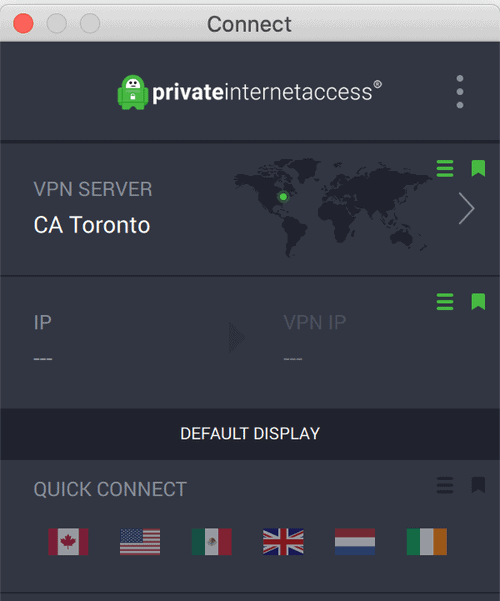
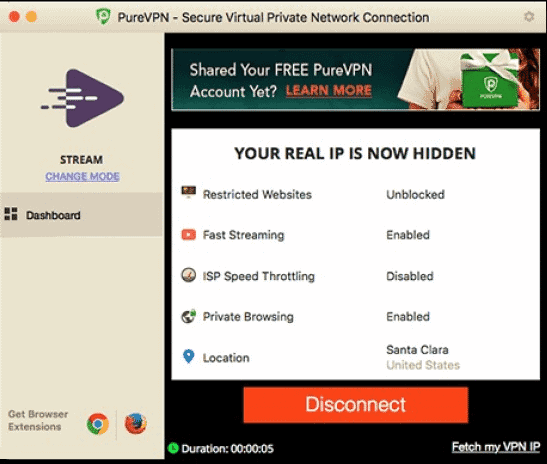
Private Internet Access supports:
- Windows
- macOS
- Linux
- iOS
- Android
- FireTV
- Chrome & Firefox browser extensions
PureVPN supports:
- Windows
- macOS
- Linux
- iOS
- Android
- Android TV
- Kodi
- Amazon Fire Stick
- Chrome & Firefox browser extensions
And both providers supply instructions on how to set up their service on many routers.
The native apps for both providers include a VPN kill switch. A kill switch blocks your traffic from exiting your device is your VPN connection should ever drop. Kill switches have become a staple in VPN client apps.
In terms of simultaneous connections, both Private Internet Access and PureVPN allow up to 10 simultaneous connections.
And both VPN providers also provide a 30-day money-back guarantee.
So it seems to be a pretty similar offering…
However, though I’m not a huge fan of PIA’s client app, I find PureVPN’s interface to be more confusing than PIA’s.
And I don’t have much appreciation for the empty security marketing with which they fill their app. Or for all of their in-app advertising - for themselves.
Also, as we’ll see a bit later Privacy Policy section - their apps are full of trackers. That’s pretty shocking, in my opinion. A privacy company is using third-party trackers in their apps? Hard to trust, no?
As far as customer support is concerned, I had no need to contact either company's customer support department. Everything just worked out of the box.
We're always happy when we don't need customer support's help, regardless what the product is.
Winner: Private Internet Access
It wouldn’t be hard to beat a provider that has ads and trackers in their client app. Even if I feel Private Internet Access’ app could be improved, PIA gets the point here, for obvious reasons.
3. Streaming
Streaming over a VPN has a few benefits. The obvious one is the security gained by having an encrypted connection to the Internet.
But you also avoid ISP bandwidth throttling, as well as circumvent geo-restrictions. Not bad.
But add to that the Netflix VPN ban, which started in 2018, and you quickly understand why unblocking Netflix access has now become a priority for many VPN services.
PureVPN provides a dedicated page on their site, explaining how to unblock Netflix. And in my tests, it worked extremely well. No lag, no buffering, just happy streaming.
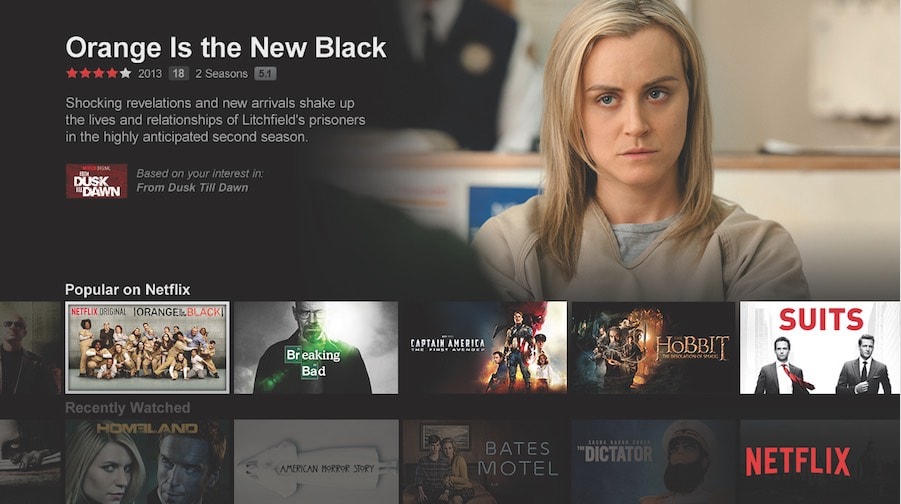
Private Internet Access, on the other hand, was not able to unblock Netflix at all, even though PIA brands itself as streaming-friendly.
But, they’re not actually trying to unblock the streaming service. PIA defines itself as a privacy company offering VPN services. Not a media unblocking service.
You can get more information on this in my Netflix reviews of Private Internet Access and PureVPN.
Winner: PureVPN
PureVPN gets the point here. They can unblock Netflix, while Private Internet Access cannot. No controversy here.
4. Security & Encryption
Private Internet Access and PureVPN both support secure VPN protocols.
Private Internet Access supports:
- IKEv2/IPSec
- OpenVPN
- WireGuard
- L2TP/IPSec
- PPTP
PureVPN supports:
- PPTP
- L2TP/IPSec
- IKEv2/IPSec
- OpenVPN
- SSTP
Both providers support the industry-standard cipher: AES-256. AES-256 is deemed extremely secure and has no known vulnerabilities.
Private Internet Access also supports WireGuard - a new, highly secure VPN protocol that is quickly becoming the default for many providers. WireGuard uses more modern ciphers (that are also deemed very secure):
- ChaCha20
- Curve25519
- BLAKE2s
- SipHash24
- HKDF
But both PureVPN and Private Internet Access also support weak and obsolete VPN protocols. This is likely offered for more technical users with legacy machines.
But as I’ve said before, I don’t think VPN providers should support weak and obsolete protocols. These should be phased out.
Winner: Private Internet Access
We’re going to give the point to Private Internet Access. While they support weak protocols, just like PureVPN, PIA also supports WireGuard. And that puts them over the top, in my book. However, we hope that in the future, both providers drop support for L2TP/IPSec ad PPTP.
5. Logs & Privacy
Private Internet Access and PureVPN, like most providers, both commit to a strong no-logging policy.
But let’s take a look at how they communicate this in their privacy policies to see how they understand user privacy.
Even though Private Internet Access has proven their no-logging claims before, they don’t make a big deal about their no-logging policy on their website.
Turning to TorrentFreak’s Which VPN Providers Really Take Anonymity Seriously in 2020? guide, PIA states the following, concerning their no-logging policy:
"We do not store any logs relating to traffic, session, DNS or metadata. There are no logs for any person or entity to match an IP address and a timestamp to a current or former user of our service. In summary, we do not log, period. Privacy is our policy.”
Looking at their actual privacy policy was a bit disappointing, as it was pretty generic. We would have liked to see a more focused privacy policy.
Still, they’ve proven their trustworthiness and there’s zero doubt in my mind that PIA does not log.
Here’s an excerpt from PureVPN’s privacy policy:
"We DO NOT keep any record of your browsing activities, connection logs, records of the VPN IPs assigned to you, your original IPs, your connection time, the history of your browsing, the sites you visited, your outgoing traffic, the content or data you accessed, or the DNS queries generated by you.”
It’s quite clear and ticks the right boxes. But PureVPN’s precedent of spying on its users makes it harder to swallow.
A VPN provider can have as many written-out, privacy-preserving policies as it wants. If it doesn’t adhere to them, not much is gained.
Companies, like people, aren’t perfect and can make mistakes. Just some mistakes are harder to overcome than others…
Winner: Private Internet Access
We’re giving the point to Private Internet Access. Not because their privacy policy blows PureVPN’s privacy policy out of the water. Rather, they don’t have the same trust deficit and have proven their commitment to not logging. That deserves the point in my book.
6. Pricing
We’re now going to turn to pricing. Below is a list of the different packages, prices, and accepted payment methods for both Private Internet Access and PureVPN:
Private Internet Access
Visit Private Internet Access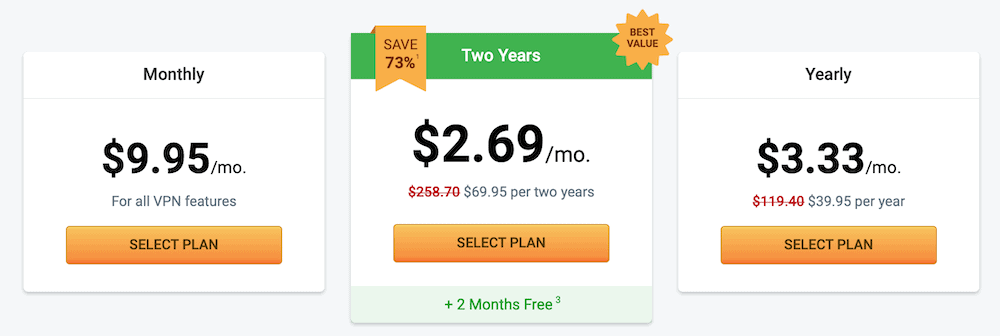
Private Internet Access offers three subscription terms:
- 9.95 USD for one month of service
- 39.95 USD for one year of service (works out to 3.33 USD per month)
- 69.95 USD for two years of service (works out to 2.69 USD per month)
Payment Methods:
- Credit card
- PayPal
- Amazon pay
- Mint
- Interac
- Many cryptocurrencies, including Bitcoin
PureVPN
Visit PureVPN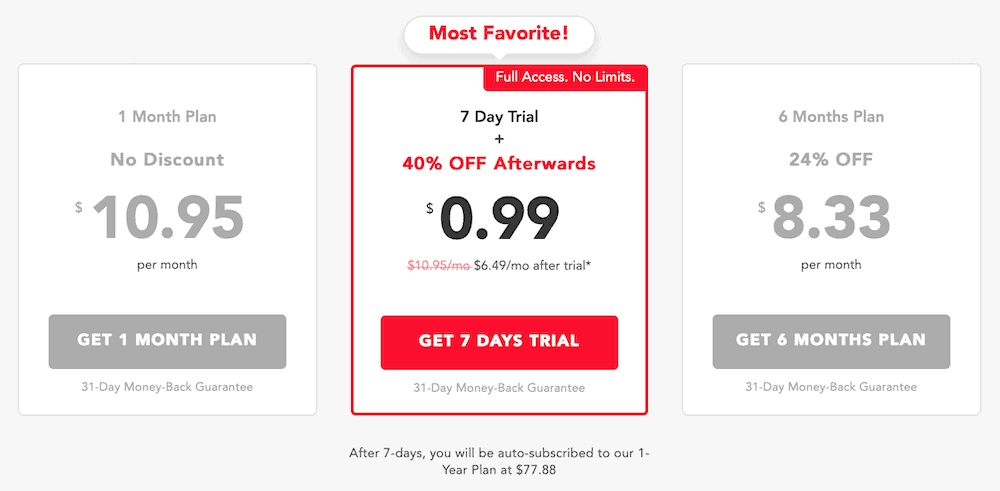
PureVPN offers four subscriptions as well:
- 0.99 USD - 7-Day
- 10.95 USD - 1 Month
- 49.98 USD - 6 Months (works out to 8.33 USD per month)
- 77.88 USD - 1 Year (works out to 6.49 USD per month)
* Note that PureVPN’s yearly plan is not advertised on their website. The 7-day trial is converted into a yearly plan unless it’s canceled before it expires.
Payment Methods:
- Credit card
- PayPal
So, Private Internet Access is cheaper than PureVPN across the board. And PIA also accepts more payment options than PureVPN.
But, crucially, PIA accepts cryptocurrencies and enables anonymous payments. PureVPN only accepts credit cards and PayPal, so no possibility of anonymous payments.
In my opinion, a VPN provider that takes user privacy seriously will accept either cash or Bitcoin to allow for anonymous payments.
Your payment trail can seriously compromise your anonymity
Winner: Private Internet Access
PIA is cheaper, they accept many more payment methods than PureVPN. And, most importantly, you can pay anonymously via Bitcoin. Private Internet Access takes it here.
7. Torrenting
We’re now looking at torrenting in our PureVPN vs. PIA comparison. And this category will very likely be a tie.
Private Internet Access doesn’t make a big splash about torrenting, but it’s supported on every server. Just connect to PIA’s network, launch your torrent client and torrent-on - no special servers here..
PureVPN takes a different approach, but it works equally well. PureVPN provides dedicated P2P servers which are indicated inside their apps. There are many servers to choose from.
I tested both providers on torrenting. And torrenting was smooth, fast, and without issue over both networks.
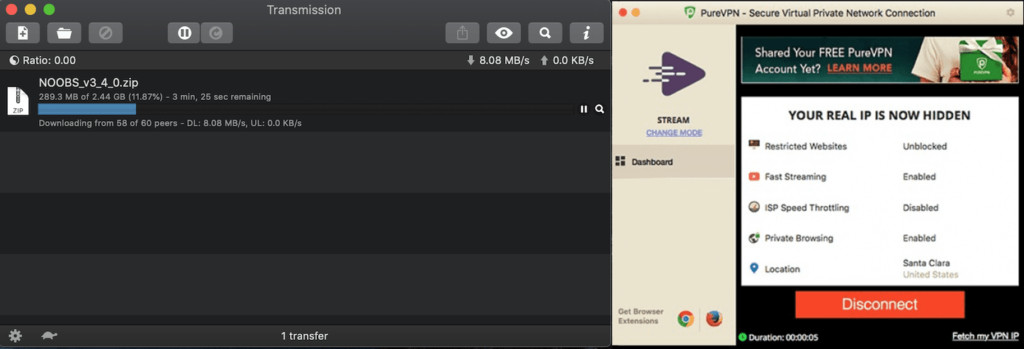

Both PIA and PureVPN support torrenting extremely well. Nothing to worry about here.
Winner: Tie
Nothing to worry about. And nothing to set them apart. Private Internet Access and PureVPN tie on torrenting.
8. Other Features
Let’s now see if there are any other features, in our PureVPN vs. PIA showdown, other than the ones we discussed, that can set these two providers apart.
- Private Internet Access provides an ads & tracker blocker (MACE)
- Private Internet Access supports split tunneling
- PureVPN spied on its users in 2017
Outstanding Features
Private Internet Access
- Split Tunnelling: PIA supports a feature called selective routing or split tunneling. Selective routing gives you a lot of flexibility in routing your traffic over the VPN connection or through your ISP connection. This you could send your bit torrent traffic through the VPN, while sending your Netflix traffic through your ISP network, for example. Another use for split tunneling is to keep access to your local LAN network when connected to the VPN. Selective routing or split tunnelling is very flexible and can be set up to accommodate almost any scenario.
- MACE: Inside all of Private Internet Access’ client apps you’ll find an ads & tracker blocker, called MACE. When you enable MACE, it will start blocking ads and trackers system-wide on your device. The feature works using a process called DNS blackholing. DNS blackholing does its filtering by checking your DNS requests against a blocklist. If your requests match anything on the blocklist, that connection is blocked (blackholed). Ads & tracker blockers are becoming the norm for VPN providers and that’s a good thing. They make the Web less obnoxious, enable you to use less bandwidth, and enhance your privacy.
PureVPN
- Spied on their users at the request of law enforcement: I’m not trying to make PureVPN look bad here, but it’s what I’m left with to set these two VPN providers apart. PureVPN simply doesn’t have any “special” features that aren’t also provided by Private Internet Access. PIA simply offers more features across the board at a lower price… And having a VPN company - a company whose bread and butter is privacy - spy on its users at the behest of law enforcement is exactly the opposite of what you’re looking for when shopping for a VPN provider. I’m not sure if this kind of breach of trust is recoverable. But it does set them apart…
Winner: Private Internet Access
PIA gets the point here. Need I explain further…?
Conclusion: PureVPN vs Private Internet Access
And the Winner Is?
We had eight categories:
One point is attributed to the winner in each category. And in case of a tie, both providers get a point.
So it looks like this:
- Speed - (Private Internet Access)
- User-Friendliness - (Private Internet Access)
- Streaming - (PureVPN)
- Security & Encryption - (Private Internet Access)
- Logs and Privacy - (Private Internet Access)
- Pricing - (Private Internet Access)
- Torrenting - (Tie)
- Other Features - (Private Internet Access)
So that’s 7 points for Private Internet Access and 2 points for PureVPN.
As I predicted, this one is not close. And it doesn’t deserve to be. I think it’s clear that, at least as far as privacy and security are concerned, PIA is the better provider. On top of that, PureVPN is significantly more expensive.
And, not to put too fine a point on it, but that trust deficit is difficult to get over.
Private Internet Access is recommended. PureVPN is not.
PureVPN
Go With PureVPN if:
- You’re not all that concerned with security & privacy
- You want to pay more for less, for some reason
- You simply want a VPN that unblocks Netflix
Private Internet Access
Go With Private Internet Access if:
- You want an included ad & tracker blocker
- You want to use Tor over VPN
- You want a VPN provider that won’t spy on you
For more information on these two VPN providers, check out our Private Internet Access review and our PureVPN review.
Thanks for reading!
VPN > VPN Comparisons > VPN Services
PureVPN Vs. Private Internet Access - Detailed Face-off
By Marc Dahan
Last updated: September 17, 2020
